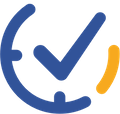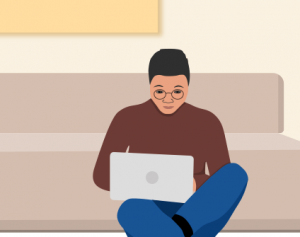Working from home has become increasingly common, but it comes with challenges. One of these challenges is building and maintaining self-discipline. Self-discipline means having the ability to stay focused on your work and resist distractions, even when you’re in a comfortable home environment. In this blog, we’ll explore practical strategies to help you improve your self-discipline while working remotely.
What is Self-Discipline
Self-discipline is the capability to effectively manage one’s behavior and maintain focus, even without external constraints. When working remotely, individuals are often responsible for managing their schedules, tasks, and distractions. It means that keeping a structured workday and sticking to set goals and priorities becomes a personal responsibility. Self-discipline is essential to ensure that you meet deadlines and maintain a healthy work-life balance. It allows you to overcome the challenges of working independently, avoid procrastination, and stay productive.
A study published in the “Journal of Personality and Social Psychology” by researcher Angela Duckworth explored the concept of “grit.” Grit, which contains passion and determination for long-term goals, is closely related to self-discipline. The study found that individuals with higher levels of grit were more likely to achieve their long-term objectives. This research highlights how self-discipline, often measured by grit, plays a fundamental role in personal and professional success, especially in settings like remote work where personal responsibility is crucial.
How to Build Self-Discipline
Daily Routine
A daily routine allows you to navigate the challenges of self-discipline and productivity. When working from home, without the physical structure of an office, it’s common for the lines between work and personal life to become blurry. A daily routine assists in setting clear working hours and breaks, encouraging a sense of organization.
How to Create a Daily Routine for Remote Work:
1. Morning Habits: Begin your day with a consistent morning routine, such as meditation, a healthy breakfast, or a brief workout, to activate your focus and energy.
2. Professional Dress Code: Dress as if you were going to the office, even when working from home. This practice can help you mentally prepare for the workday and hold a professional mindset throughout your remote work hours.
3. Set Clear Working Hours: Define specific working hours that separate your professional and personal life, allowing you to keep a healthy work-life balance.
4. Scheduled Breaks: Give time for regular breaks to refresh your mental and physical energy, preventing burnout and sustaining productivity.
5. Structured Task List: Create a prioritized to-do list for the day, ensuring you stay organized and focused on essential work.
6. Lunch and Outdoor Activity: Set aside time for a proper lunch break and engage in a short outdoor activity to refresh your mind and body.
7. End-of-Day Rituals: End your workday with a routine that signifies the transition to personal time, whether it’s tidying up your workspace or setting goals for the following day.
Visual Reminders
Visual reminders play a crucial role in building self-discipline when working remotely. These cues serve as constant, non-verbal prompts that help support your commitment to your goals and staying focused. When placed strategically in your workspace or home, these reminders create a visual environment that promotes discipline and motivation. Whether it’s a motivational quote, a vision board, or inspiring images that resonate with your ambitions, these visual cues serve as silent encouragers throughout your workday.
To effectively implement visual reminders, consider the following tips:
– Choose or create visuals that align with your personal and professional goals, evoking positive emotions and aspirations.
– Ensure that the visuals blend well with your working environment to improve your focus rather than distract from it.
– Consistently expose yourself to these visual cues to keep self-discipline and motivation in your remote work setting.

Dealing with Isolation
Remote work often involves periods of solitary work, fostering feelings of isolation that can hinder self-discipline. The lack of in-person social interactions can affect your motivation and pose challenges in maintaining focus and productivity. The absence of colleagues may reduce external responsibility, which plays a vital role in self-discipline.
To manage isolation and support self-discipline, consider integrating social elements into your work breaks. Schedule virtual coffee breaks or brief conversations with coworkers to recreate the social interactions typical in an office environment, allowing you to exchange experiences and renew your motivation. You can also engage in professional online communities or forums within your industry, which can simulate the social connections you may be missing. These platforms offer opportunities for discussion and networking with peers, keeping you informed and inspired in your field.

Continuous Learning
One of the essential aspects of self-discipline in a remote work environment is continuous learning. It’s not only about your job-related skills but a holistic approach to self-improvement. Engaging in constant learning helps encourage the self-discipline required to stay committed to personal and professional growth. The ability to set goals, stick to a learning schedule, and persist in acquiring new skills can translate into a disciplined work ethic that keeps you on track during remote work. Continuous learning is a strong motivator that reinforces your commitment to self-improvement and productivity.
To assume continuous learning and develop self-discipline, try these tips:
– Set Clear Learning Goals: Start by defining specific learning objectives and recognizing the skills or knowledge areas you aim to develop.
– Create a Learning Schedule: Establish a structured timetable for your learning activities and give dedicated time slots for them during your workday.
– Self-Progress Tracking: Hold yourself accountable by monitoring your progress and recognizing your achievements as you reach your learning goals.
– Explore Online Resources: Use online courses, webinars, or virtual workshops as valuable tools to improve your skills and stay current in your field.
Even when you come up short on one of your goals, it’s not a signal to give up. Tomorrow brings a new chance for success. Self-discipline is a quality that grows through continuous effort, and the fruits of your work are valuable. With time, it will change into a trustworthy habit that empowers you. Welcome the path of self-discipline and keep moving forward with optimism and determination.




